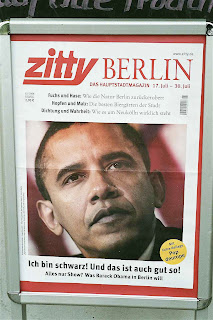

global nomads share their experience ◦ thoughts on moving (and shaking!), settling, adjusting, accepting, rejecting, discovering, and taming (people, territories and ourselves)◦ it's about transitions ◦ transatlantic et al ◦ in progress ☺
 So the traffic policy didn’t provide us with a working example of Swiss efficiency. Social rituals in a beer garden did, though. In that self-service beer garden right on the bank of the Limmat where it meets the Zurich lake, people didn’t order one beer, and than maybe another one later. They went for the crates instead.
So the traffic policy didn’t provide us with a working example of Swiss efficiency. Social rituals in a beer garden did, though. In that self-service beer garden right on the bank of the Limmat where it meets the Zurich lake, people didn’t order one beer, and than maybe another one later. They went for the crates instead. Granted, some of these 200,000 must have been US expatriates. But the majority were Germans celebrating their somewhat bizzare love affair with Barack Obama. “Obama for Kanzler”, Obama for German Chancellor, one sign sticking out of the crowd read in hopeless Denglisch, this mixture of German (Deutsch) and English that has become so common in this country, transcending decent bakeries, zu Deutsch: Bäckereien, into “Back-Shops”.
Granted, some of these 200,000 must have been US expatriates. But the majority were Germans celebrating their somewhat bizzare love affair with Barack Obama. “Obama for Kanzler”, Obama for German Chancellor, one sign sticking out of the crowd read in hopeless Denglisch, this mixture of German (Deutsch) and English that has become so common in this country, transcending decent bakeries, zu Deutsch: Bäckereien, into “Back-Shops”. Obama in a couple of months. And turn our backs on him, too, sinking back into our good old habit of Politikverdrossenheit.
Obama in a couple of months. And turn our backs on him, too, sinking back into our good old habit of Politikverdrossenheit.

 On top of everything, his rising fame even outside the soccer fan community - which began at the world championship in 2006 - seems not to have damaged this guy's golden heart in the least. Among other things, the 24-year-old lends his face to a campaign against speeding on Germany's infamous highways, playing with his being small in physique by declaring: "Speeders are SO cool", showing a tiny distance between his thumb and middle finger. And he founded a charity to support underprivileged children in Europe and Africa. "I had a super childhood, I have always been privileged", he said in an interview. "Now I want to give something back."
On top of everything, his rising fame even outside the soccer fan community - which began at the world championship in 2006 - seems not to have damaged this guy's golden heart in the least. Among other things, the 24-year-old lends his face to a campaign against speeding on Germany's infamous highways, playing with his being small in physique by declaring: "Speeders are SO cool", showing a tiny distance between his thumb and middle finger. And he founded a charity to support underprivileged children in Europe and Africa. "I had a super childhood, I have always been privileged", he said in an interview. "Now I want to give something back." His picture hung right next to my eight year old son's classroom door, framed by US flags. “We Salute... One Of Our Country’s Many Heroes Fighting In Iraq, Army Private 1st Class Daniel Gabryszewski”, said the poster that the second graders had made. Danny wears an overall in camouflage color. The martial outfit somewhat distracts from the fact that he, like Philipp Lahm, is more on the tiny side.
His picture hung right next to my eight year old son's classroom door, framed by US flags. “We Salute... One Of Our Country’s Many Heroes Fighting In Iraq, Army Private 1st Class Daniel Gabryszewski”, said the poster that the second graders had made. Danny wears an overall in camouflage color. The martial outfit somewhat distracts from the fact that he, like Philipp Lahm, is more on the tiny side.
 Then, of course, the whole country is in soccer euphoria. Flags everywhere. Hanging out of windows, sticking on cars (eight was the highest number of flags I have counted on a single car), even on baby strollers. Hardly a bar, café, or restaurant that hasn't installed huge TV screens to encourage - and profit from - the collective worshipping of the Soccer God.
Then, of course, the whole country is in soccer euphoria. Flags everywhere. Hanging out of windows, sticking on cars (eight was the highest number of flags I have counted on a single car), even on baby strollers. Hardly a bar, café, or restaurant that hasn't installed huge TV screens to encourage - and profit from - the collective worshipping of the Soccer God. course. But two years as immigrant in the US have made it pretty clear to me that without a healthy dose of patriotism, a country's identity and self confidence probably won't be worth much. And a national identity, a certain feeling of belonging somewhere worth belonging, is something one comes to cherish even more when living as - and sometimes feeling like - a Non-Resident Alien in a foreign country.
course. But two years as immigrant in the US have made it pretty clear to me that without a healthy dose of patriotism, a country's identity and self confidence probably won't be worth much. And a national identity, a certain feeling of belonging somewhere worth belonging, is something one comes to cherish even more when living as - and sometimes feeling like - a Non-Resident Alien in a foreign country.